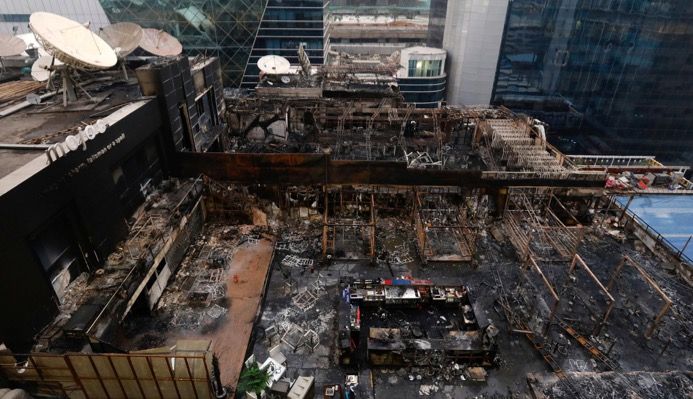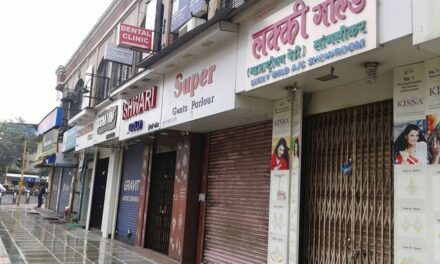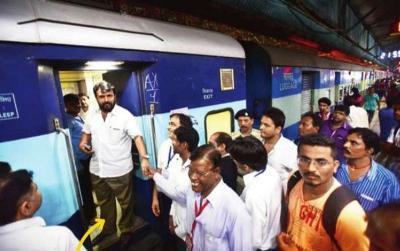10 key takeaways from BMC’s inquiry report on Kamala Mills fire


BMC Chief Ajoy Mehta submitted the report on the Kamala Mills fire incident to Chief Minister Devendra Fadnavis yesterday
Brihanmumbai Municipal Corporation (BMC) Commissioner Ajoy Mehta on Thursday submitted an inquiry report into Kamala Mills fire incident to the Maharashtra government, nearly three weeks after 14 people were killed in the tragic blaze.
Mehta handed over the report to Chief Minister Devendra Fadanvis yesterday. The report was also forwarded to Police Commissioner Dattatray Padsalgikar and Mumbai Mayor Vishwanath Mahadeshwar for evaluation and further action.
The 7-page report, which will also be uploaded on the BMC website, covers everything from the cause of the fire, the failures that led to it, proposed action against offenders and changes that could be made to avoid the reoccurrence of a similar catastrophe.
Here are 10 key takeaways from the BMC report:
1. The BMC arrived at the same conclusion as the fire department, noting that the blaze started due to flying embers from the coal used for hookah being illegally served at Mojo’s Bistro restaurant.
2. Since both Mojo’s Bistro and the adjacent 1Above had used combustible materials at their premises, which caused the fire to spread quickly, the BMC has sought action against the architect and interior decorators involved in the construction of the two pubs as they had not done any due diligence and helped create an unauthorised structure that had all the ingredients for the occurrence of such a disaster.
3. Apart from the pub owners, the civic body held the owner of the property responsible for the deaths as he allowed them to use the terrace area, which was not permitted, without adhering to any fire safety rules. It is also likely that the owner used the area beyond the permissible limits for commercial gains.
4. The civic body has proposed to initiate criminal action against the owners of the premises, owners of the two restaurants, the architect, and the interior decorator, as they all aided and abetted the unauthorised works and illegal activities. It has also called for an investigation into the role of the facility manager as mentioned in the leave and license agreement made with the restaurant owner.
5. The BMC observed that certain departments had either given permissions or failed to take action against the illegal use of terrace areas and unauthorised construction under MMC and MRTP Act. Therefore, apart from the five civic officials that had already been suspended, it also ordered a full-fledged departmental inquiry of 10 officials from the Building Proposal Department, G/South Ward and fire brigade, including two assistant commissioners (Prashant Sapkale and Bhagyashree Kapse) and deputy executive health officer.
6. The municipal corporation further acknowledged the gross misuse of the user as stipulated in DCR & IT policy in addition to violations of various DC regulations, i.e, change in activity and construction beyond approval. It has sought three months to undertake a detailed survey and submit its report on floor space index (FSI) violations, unauthorised alterations, additions etc.
7. The BMC has proposed to change the existing eating house licensing and monsoon shed permission procedure along with changes in the MMC Act to include a stringent provision of punishment and incentivise honest self-declaration. It noted that there was a need for strengthening the implementation of machinery without compromising on the speed of delivery as expected under ease of doing business.
8. The report further highlights that since the biggest contributor to the cost of setting up a restaurant is the rental, owners have a tendency to bring in more and more area under business operations even though it would mean encroaching on areas which aren’t permitted. The first casualty in this is the mandatory open spaces and passages leading to escape routes and staircases. It is thus imperative that these are regulated through a combination of self-policing and a robust compliance agency.
9. The civic body observed that the tragedy took place at the intersection of greed fuelled by impunity and utter contempt for rules and failure of various agencies to ensure compliance and admitted that while a great deal of attention is paid to the approval process, the mechanism that is being implemented on the ground level is far different.
10. The report suggests the creation of independent audit wings under trade organisations, like AHAR for restaurants, which could conduct checks and bar members if their establishments failed to comply with fire safety rules. Other suggestions include the appointment of a fire safety officer in every commercial establishment and creation of a separate compliance wing under the Mumbai Fire Brigade. It also highlights the need for business premises to put out information relating to safety measures in legally mandated formats in a public domain.













